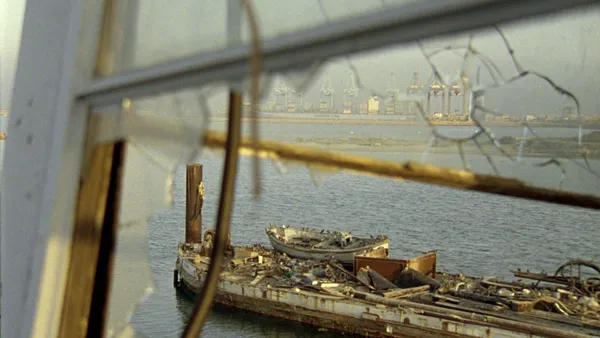Eye For Film >> Movies >> The Forgotten Space (2010) Film Review
The Forgotten Space
Reviewed by: Michael Pattison

The Forgotten Space, an eminently ambitious and self-proclaimed “film-essay”, was seven years in the making, shot in no less than six countries and takes as its theme the formidably pertinent subject matter of transglobal capitalism, as exemplified by containerisation. On the one hand, this latter phenomenon is visible, finding its visual metonym in the container itself, an instantly recognisable, block-coloured metal cuboid whose appearance is functionally bland. On the other hand, the container is invisible, a part of an ongoing industrial activity and inseparable from many other containers (in appearance alone, their exteriors are interchangeably anonymous, while their contents remain unknown), comprising an unseen world of ceaseless flux, of ebb and flow across the world’s seas, far removed from the everyday lives dependent upon the goods transported inside them.
The movie’s also a mess. If the essayistic relies to some degree upon a contestable voice — embodied often but not always by the speculative, conversational address of the voice-over — then the narration in Noël Burch and Allan Sekula’s film is dangerously thin on concrete (and thus chewable, contestable) analysis, and instead invests too much in that all-too-familiar poeticism of epigrammatic wit, delivered with Sekula’s own insufferably humourless public-radio drawl. This, “the unlikely story of a steel box that changed the world’s trading system”, is not without intermittent insights. But there are about six or seven fascinating shorts competing for attention here, and Burch and Sekula’s respective backgrounds pull the film one way and then the other, never quite settling into a structurally or aesthetically consistent framework with which to lastingly interrogate an overriding thesis.

Not everyone can be Patrick Keiller. As one tries to latch onto one narrative current here, though, one begins to marvel even more at the humour and density Keiller manages to interweave through his 2001 essay ‘Port Statistics’, which shares with Burch and Sekula’s work a curiosity and concern for the apparently visible decline in port activity across the world. On a filmic level, Keiller’s own Robinson In Space (1997) is as apt a comparator as any: dense, ambitious, lyrical and pointed, it’s the kind of genius rarity that makes The Forgotten Space look decidedly amateurish.
Burch and Sekula’s film is simply too busy. Musical accompaniment distracts throughout, while something as basic as when and when not to cut from one shot to the next during a narrated sequence of images is so lacking that everything seems difficult to digest — perhaps deliberately so. Indeed, it’s possible that the filmmakers felt the need to sex up their ostensibly dry material with continual aesthetic flourishes, or else they may have felt overly indebted to the distancing techniques of the Dziga Vertov Group’s politicised essay films. Either way, the result is irksome.
A word, though, on the few redeeming features struggling for their own airtime. There’s the history of the container itself: the logical culmination of a lineage that began with the first baskets and slings, invented most likely by women following the hunter-gatherer period, who needed to collect crops while physically burdened with babies. There’s the Betuweroute, the double-track railway that runs between Rotterdam and Germany whose diversionary route around urban centres impacted the landscape around them. There’s the obvious displacement (geographic and economic) that results from such processes.
There’s the suggestion that today’s maritime trade is in decline because of the international social-democracy’s prolonged adherence to neoliberalism (and its privatisation of public services in the 1990s, and its emphasis upon economic growth at any cost). There’s that industrial building mentioned and spoken about but hardly contextualised and barely seen, in Hong Kong, in which an internal ramp allows for the constant flow of transportation trucks to avoid traffic jams. And there’s the claim that in 10-15 years, the Chinese working class will develop a political consciousness that will shift the world’s labour-capital relationship in favour of labour.
More of that, please.
Reviewed on: 08 Mar 2014


















